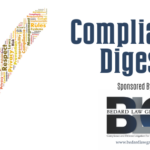I’m thrilled to announce that Bedard Law Group is the new sponsor for the Compliance Digest. Bedard Law Group, P.C. – Compliance Support – Defense Litigation – Nationwide Complaint Management – Turnkey Speech Analytics. And Our New BLG360 Program – Your Low Monthly Retainer Compliance Solution. Visit www.bedardlawgroup.com, email John H. Bedard, Jr., or call (678) 253-1871.

Every week, AccountsRecovery.net brings you the most important news in the industry. But, with compliance-related articles, context is king. That’s why the brightest and most knowledgable compliance experts are sought to offer their perspectives and insights into the most important news of the day. Read on to hear what the experts have to say this week.
FCC, FTC Tackling AI’s Growing Involvement in Phone Calls
Both the Federal Communications Commission and the Federal Trade Commission are making efforts to tackle the impact that artificial intelligence can have on communications between consumers and companies, both over the phone and via text messaging. It’s likely that we will continue to see more focus, and potentially more regulation, as the federal government seeks to protect consumers from the potential negative aspects that AI can have. More details here.
WHAT THIS MEANS, FROM ARI DERMAN OF CLARK HILL: These new developments from the Federal Communications Commission (FCC) and the Federal Trade Commission (FTC) regarding AI were fairly predictable. In April we had the Justice Department’s Civil Rights Division and officials from the Consumer Financial Protection Bureau (CFPB), the Equal Employment Opportunity Commission (EEOC) and the FTC jointly pledge to monitor developments in AI to ensure the “core principles of fairness, equality, and justice” were upheld in this emerging industry. Over the summer, the CFPB got more granular, by publishing an Issue Spotlight titled “Chatbots in Consumer Finance,” cautioning against the reliance on advanced chatbots in financial services markets, by saying it can lead to violations of consumer finance laws, harm consumers by providing inaccurate information and diminish customer service. The FCC and FTC are now following suit and trying to ascertain how AI may impact the increasingly regulated world of phone calls and text messaging. It is relevant to note however that many ARM industry players openly questioned the CFPB’s initial position on AI chatbots. For example, in our firm’s June Alert on this issue, we mentioned that the raw complaint data from the Bureau actually showed how the allegations of misuse were exaggerated, and that many consumers were actually benefitting from the AI-based technology. With that in mind, as the FCC and FTC dive in further on evaluating the use of AI in calls and texts, we hope that they are now willing to take a step back and do so in an evenhanded manner that more effectively analyzes the pros and cons surrounding the technology.
THE COMPLIANCE DIGEST IS SPONSORED BY:

Judge Sanctions Plaintiff, Grants MSJ For Defense in FDCPA Case
Not showing up for a deposition is a big no-no in the legal world and a plaintiff in a Fair Debt Collection Practices Act case is going to have to pay because of it after the District Court judge not only granted the defendant’s motion for summary judgment, but also for sanctions against the plaintiff. More details here.
WHAT THIS MEANS, FROM STACY RODRIGUEZ OF ACTUATE LAW: A pending FDCPA lawsuit in Georgia federal court highlights the power of the defense to address frivolous complaints. Here, a plaintiff, represented by several law firms, filed FDCPA claims based on the theory that a credit card account in collection never belonged to her. Plaintiff’s claims of identity theft collapsed, however, after the defense presented recordings of the plaintiff acknowledging her account. Yet, Plaintiff and her attorneys never corrected the record or withdrew false declarations, instead continuing to pursue a factually and legally false theory.
The defendant, represented by Barron & Newburger, P.C., modeled exactly what to do in a situation like this. Set the plaintiff’s deposition. Ask for sanctions. Ask for fees. Ask the Court to get involved and require the plaintiff and plaintiff’s counsel to appear and explain themselves. All too often, defense fee requests under the FDCPA and even Rule 11 (or state equivalents) go ungranted. Perhaps Courts feel that ending the lawsuit with a defense win is enough. But, sometimes, a judge understands that the plaintiff and/or plaintiff’s counsel should not have brazenly wasted everyone’s time and money on claims that lack merit. It seems that United States District Judge Charles A. Pannell, Jr. and United States Magistrate Judge John K. Larkins III may understand that the “W” itself is not always a sufficient result. The Court already has granted sanctions and a limited fee and cost award against Plaintiff under Federal Rule 37(d), based on the plaintiff’s failure to appear for deposition. The Court has also created a schedule for the briefing of a defense motion for sanctions and attorneys’ fees against the plaintiff under Rule 11, 28 U.S.C. § 1927, 15 U.S.C. § 1692k, and the Court’s inherent power. Those sanction and fee requests remain pending, and I’m hopeful for a satisfying result. While not every successful defense warrants a request to recover fees, we shouldn’t hesitate to ask when the justification is clear.
Appeals Court Overturns FDCPA Ruling
The Court of Appeals for the Ninth Circuit has overturned a lower court’s ruling in a Fair Debt Collection Practices Act case that has to do with judgments and a legal principle that aims to keep federal courts out of issues that were already dealt with in state court. More details here.
WHAT THIS MEANS, FROM VIRGINIA BELL FLYNN OF TROUTMAN PEPPER: On November 21, the Ninth Circuit Court of Appeals narrowly interpreted a rule that prevents federal district courts from hearing appeals of state court decisions, and thus allowed an FDCPA claim to proceed.
In Brown v. Duringer L. Grp. PLC, a group of California tenants alleged that a law firm had violated the Fair Debt Collection Practices Act (FDCPA) by filing a duplicative memorandum of costs in state court. The case stems from a tenant/landlord dispute that is over a decade old. In 2010, the tenants breached their lease agreement and the California Superior Court entered judgment in favor of the landlord. The landlord attempted to enforce that judgment in 2020 by filing a memorandum of costs. The tenants moved to quash and filed a claim of exemption, both of which were denied by the state court. The landlord’s law firm eventually received the funds, but before receiving the funds the firm filed a second memorandum of costs. The tenants asserted that the second memorandum of costs violated the FDCPA.
The law firm argued that the FDCPA action was barred by the “Rooker Feldman Doctrine,” which “precludes a United States district court from exercising subject-matter jurisdiction” if the action asks the federal district court to “overturn an injurious state-court judgment.” Exxon Mobil Corp. v. Saudi Basic Indus. Corp., 544 U.S. 280, 291–92 (2005). The doctrine “is confined to . . . cases [1] brought by state-court losers [2] complaining of injuries caused by state-court judgments [3] rendered before the district court proceedings commenced and [4] inviting district court review and rejection of those judgments.” Id. at 284.
The Ninth Circuit interpreted the FDCPA claim to be based on the second memorandum of costs, which a state court had not weighed in on. The Ninth Circuit rejected arguments that (1) the second memorandum of costs was predicated on the 2010 state court judgment and (2) the federal district court would have to determine the accuracy of the state court’s memorandum of costs. The Ninth Circuit held that the state court decisions had not explicitly “address[ed] those issues[.]”
Takeaway: Litigants in the Ninth Circuit can bring FDCPA and similar claims based on state court filings, so long as they are challenging a discrete act the state court has not explicitly ruled on.
I’m thrilled to announce that Bedard Law Group is the new sponsor for the Compliance Digest. Bedard Law Group, P.C. – Compliance Support – Defense Litigation – Nationwide Complaint Management – Turnkey Speech Analytics. And Our New BLG360 Program – Your Low Monthly Retainer Compliance Solution. Visit www.bedardlawgroup.com, email John H. Bedard, Jr., or call (678) 253-1871.












